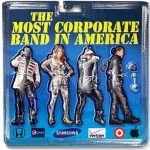Twitter is watching you.

................................................................................................................................
Although Animal Farm is one of my favorite novels, George Orwell really annoyed me with 1984. Well, just kidding, I really liked that book too. I was just bitter that he picked my birth year to predict a totalitarian world where privacy and civil rights didn’t exist anywhere. I mean, I thought 1984 was great year for a baby. Anyway, he might have been onto something, just a decade or two too early.
Though mainly non-partisan when it comes to politics, it was hard not to see the door to our liberties close slightly with the Patriot Act of 2001. A statue that allowed the government to selectively access telephone, email, medical and financial records to protect our “freedom”, it made everyone wonder … is anything private anymore? Well, not really. And with the crazy technological boom of the past decade, it’s made the line between what is private and what is public not only blurry, but pretty much invisible.
Insert the social media craze. Whether searching for a job, investigating a crime, or just trying to spread a plethora of fast knowledge, outlets such as Facebook and Twitter have become catalysts for studying human behavior and examining an individual’s thoughts. Now some of these thoughts are being filed into public record ... and studied.
Read more
Bar Call
Belve? Stones? The Shack?
Here’s an interesting article on the benefits and pitfalls of developing and marketing your own brand's bar call.
What's in a Nickname? In Spirits World, an Implied Relationship
What do you think? Should brands develop their own nicknames or leave it to consumers? And, what are some memorable brand nicknames that you like or dislike?
Where Will Olympic Athletes Pop Up Next?

......................................................................................................................................................................
Over the past three decades, how many Olympic athletes can you name? Did your memory conjure up images of the medal ceremony or the face on the Wheaties box? "Being an Olympic athlete can be a very depressing experience: You spend four years grinding away for that one Olympic opportunity where you become really huge, if you're lucky, for 3 or 4 weeks, and then you go back into oblivion," said Boyce Watkins, a faculty affiliate at the College Sport Research Institute at the University of North Carolina at Chapel Hill. Well, this ill-fated reality for some is far from the truth for those Olympic athletes who find themselves signing an endorsement deal. Read more
Administrative Professionals Week
Working in an office environment is great. There is fresh brewed coffee in the break room, your calls get transferred directly to your desk, your mail gets sent out promptly by simply dropping it in the Outgoing box, and you always have fresh pens and notepads at your disposal. It’s like magic. These little cohesive consistencies are what can keep each day from completely going up in flames, when chaos has engulfed everything else.
But it’s not magic. Well, it’s not wand-waving, spell enchanting magic, but it’s definitely something special. And it doesn’t just materialize on it’s own. There are a lot of hardworking individuals who are behind these seemingly simple tasks. But there is nothing simple, or easy, about being an administrative assistant. They, for lack of a better expression, are the glue, well for fun, let’s call them the super glue, that keeps an office and an office environment efficient.
This year, Aprils 18th to April 24th marks the National Administrative Professionals Appreciation Week, with Administrative Professionals Day landing on April 21st. Though you should always appreciate the hard work of your colleagues, especially your admins, this week is especially set aside for you to outwardly express your admiration and gratitude towards them for what they do.
Formally known as Professional Secretaries Week, before America got all politically correct in 2000 and updated the name/title, this evolving holiday was first created back in 1952 through the work of Harry F. Klemfuss, a New York publicist. He wanted to encourage more people, especially women, to consider careers in the secretarial field.
Fast-forward half a century, through civil rights and the bra burning years, the role of secretary as well as the gender has changed drastically. Administrative professionals are no longer Aquanet wearing, note-taking women, but serious business professionals. In fact, some prominent executive administrators are some of the highest paid people in corporate America. And they aren’t all women. Can we say Mark from Ugly Betty?
But whatever role they play in your particular office environment, they are the smile that greets you at the door and the ‘Have a nice day!’, as you leave. They are your organizational outlook and your personal reminder. They make your job easier.
So show your appreciation this week for one of largest workplace observances in any way you can. Flowers, candies, gift cards, etc. … and who doesn’t like to be taken out to lunch?? I’m just saying …
How do you plan to thank your administrative professionals? Leave your thoughts below.
Contributed by: Keri Lynch
Is a Band a Brand?

......................................................................................................................................................................
According to Black Eyed Peas' frontman, will.i.am, his most definitely is. In a recent article published by The Wall Street Journal will.i.am defines his approach to corporate sponsors, "I consider us a brand. A brand always has stylized [PowerPoint] decks, from colors to fonts. Here's our demographic. Here's the reach. Here's the potential. Here's how the consumer will benefit from the collaboration." This approach has proved successful for the man who Randy Phillips, president and CEO of the concert promoter AEG Live, says could be "the best ad executive on Madison Avenue." Not only do the Black Eyed Peas (or their songs) appear in partnership with giants like Coors, Levi's, Honda, Apple, Verizon and Pepsi, but corporate sponsor "shout outs" have become a regular part of the live show. In the first half of every show will.i.am delivers a freestyle rap he creates from text messages scrolling on two large screens on-stage. The text messages are delivered by BlackBerry, the tour's primary sponsor. The band also works in the company's tagline "Love What You Do" into the seemingly impulsive monologue during the group's performance of "Where Is The Love." The Black Eyed Peas even performed a concert in Times Square for the sole purpose of promoting a new Samsung product.
For an industry of artists who have reported "it's all about the music", this band leader has been quoted as saying corporate partnerships are equally as important as music sales. What do you think? Savvy celebrity or sellout? Can a band be a brand?
Contributed by: Allison Jobes
Brand Survival

......................................................................................................................................................................
We’ve all heard about the hundreds of Toyota cars that have been recalled due to sticking accelerators and the pedal entrapment issues (or the "big boo boo"). While Toyota has to gone to great measures to fix these issues, an even bigger question remains. Will the Toyota brand survive this tremendous hit and how have they responded to this crisis? This is a touchy topic, for many reasons. How do you put trust back into a brand that’s caused so many tragedies by way of a seemingly easily fixable flaw? Read more
What's with April 15th?
Today marks the one blemish in April’s usually blooming record: Tax Return Day. Eh, well, April is also the beginning of tornado season, but I digress. A post office’s nightmare and a CPA’s dream, tax season gives a whole new light to mathematics and itemization. People find themselves scrambling through old shoeboxes for missing receipts and trying to mentally calculate volunteer work and “charitable” donations they can claim in hopes of squeezing every penny out of their return.
But why April 15th? Who chose this day to make people sweat an audit and pile themselves in papers? So I decided to dig around a little bit, and by a little bit, I went straight to Wikipedia. C’mon, everyone uses it, but no one wants to admit to.
According to the highly distinguished website, Congress was the one to put “tax day” on the calendar. When we, “America”, ratified the 16th Amendment in 1913, which allowed Congress to institute an income tax, they chose March 1st of the following year as the deadline for filing returns. However, with the Revenue Act of 1918, which I probably need to pick up a text book to see what that was about, they up and moved the date to March 15th. It wasn’t until 1955 though, that Congress finally settled on the April 15th deadline. I think it was because April is prettier, but apparently it was to spread out the workload for the IRS. It’s also rumored that the growing middle class was filing more and more returns and the government wanted a little more time to hold on to the money. Sneaky.
Although fulfilled with this great public encyclopedia knowledge about something that I still get my dad to do for me every year (yes, I’m 25), I also don’t want to spread lies. Therefore, I decided I needed to verify this information. After some intense Google searching, I stumbled across an article on CNN from April 15, 2002, which basically laid out the same information verbatim. And everyone trusts CNN.
So there you have it. That’s why April 15th is, well the day it is. So put the remote down, turn your laptop on and get to filling.
Contributed by: Keri Lynch
Go Forth and Add!
As we have learned from the Chevy Nova, it is important to perform an accurate linguistic screen in all markets where you intend to launch your product. As you may have heard, the Nova was not such a big hit with Spanish-speakers. Translated literally, its name means “star” but when spoken it sounds like “no va” meaning “it doesn’t go.” Oops.
Recently, PepsiCo announced that it is teaming up with Eva Longoria Parker to promote their new campaign, titled “Yo Sumo.” The campaign, inspired by this decade’s census, is to encourage Hispanics, especially the younger generation, to not only be counted numerically, but also share their experiences of how they have contributed to making a difference in the American landscape. The campaign is truly inspiring as it motivates multicultural America to participate not just be another number.
The problem here is this: Yo Sumo is translated literally as “I count,” as in, “I add numbers,” or one plus one is two. This could be interpreted as a “math is fun” campaign. It could also evoke imagery of a certain Japanese style of wrestling.
Unfortunately, the subtle nuances and double entendre of “I count” are lost in translation. Would a better phrase have been “Yo Cuento” as the translational abilities offer a broader range of meaning? Or is leaving it “Yo Sumo” okay, so long as Pepsi imbues the desired meaning? I am left to wonder if a native Spanish-speaker contributed to the brainstorming and ultimate name creation of the campaign. If that’s the case, then perhaps instilling meaning is, indeed, the intention.
No matter what, thankfully, “Yo Sumo” definitely does not mean “it doesn’t go,” so hopefully the initiative will take off!
Happy Birthday BOTOX!


While the results are temporary, I have a feeling BOTOX® is here to stay.
Did you know BOTOX is the most popular non-surgical beauty treatment in the world? It is also one of the world's most versatile and most widely researched medicines in the world.
Botulinum toxin, a purified protein derived from the bacterium Clostridium botulinum has been researched for over 100 years. Since it was identified in 1895, researchers have been intrigued by its potential therapeutic uses.
In 1987, Jean Carruthers discovered that injections of botulinum type A could erase lines and wrinkles. Botox was first approved on March 14th, 1990 for the treatment of misaligned eyes, uncontrollable blinking and nerve disorder. Soon to follow would be approvals to reduce the symptoms of muscle contractions in the neck and foot deformity. Most recently, in July 2004, BOTOX was granted approval in the United States to treat the symptoms of severe underarm sweating. A similar product is BOTOX Cosmetic®, which is approved for the treatment of frown lines between the eyebrows, forehead wrinkles and crow's feet.
Today, BOTOX is one of the most popular physician-administered aesthetic prescription procedures and researchers are exploring many medical uses for BOTOX. It is currently seeking approval from the FDA for migraine headaches.
Why is the product so popular? Many believe this is because of its ability to achieve predictable and measurable results through a relatively simple treatment that requires no surgery.
Happy Birthday, BOTOX! Make a wish!
Contributed by: Ashley Popham
Caribou Coffee gets a New Logo

Caribou Coffee is undergoing a makeover! Moving away from the ski lodge atmosphere, the new look will be less regional and more contemporary, "a fresh variation of the same elements" according to the company's website. The new brand look includes a new logo, color palette and design elements. The caribou has been reworked and now features "C" shaped antlers and a coffee bean body. In addition, the caribou in the previous logo was leaping left, whereas the caribou now leaps right, signifying the company as it heads into the future. The shield element from the original logo has been updated to a new shape, which resembles national park signage, in honor of their founders' hike in Alaska's Denali National Park that inspired the company's foundation. The more stylized, upscale logo Read more
